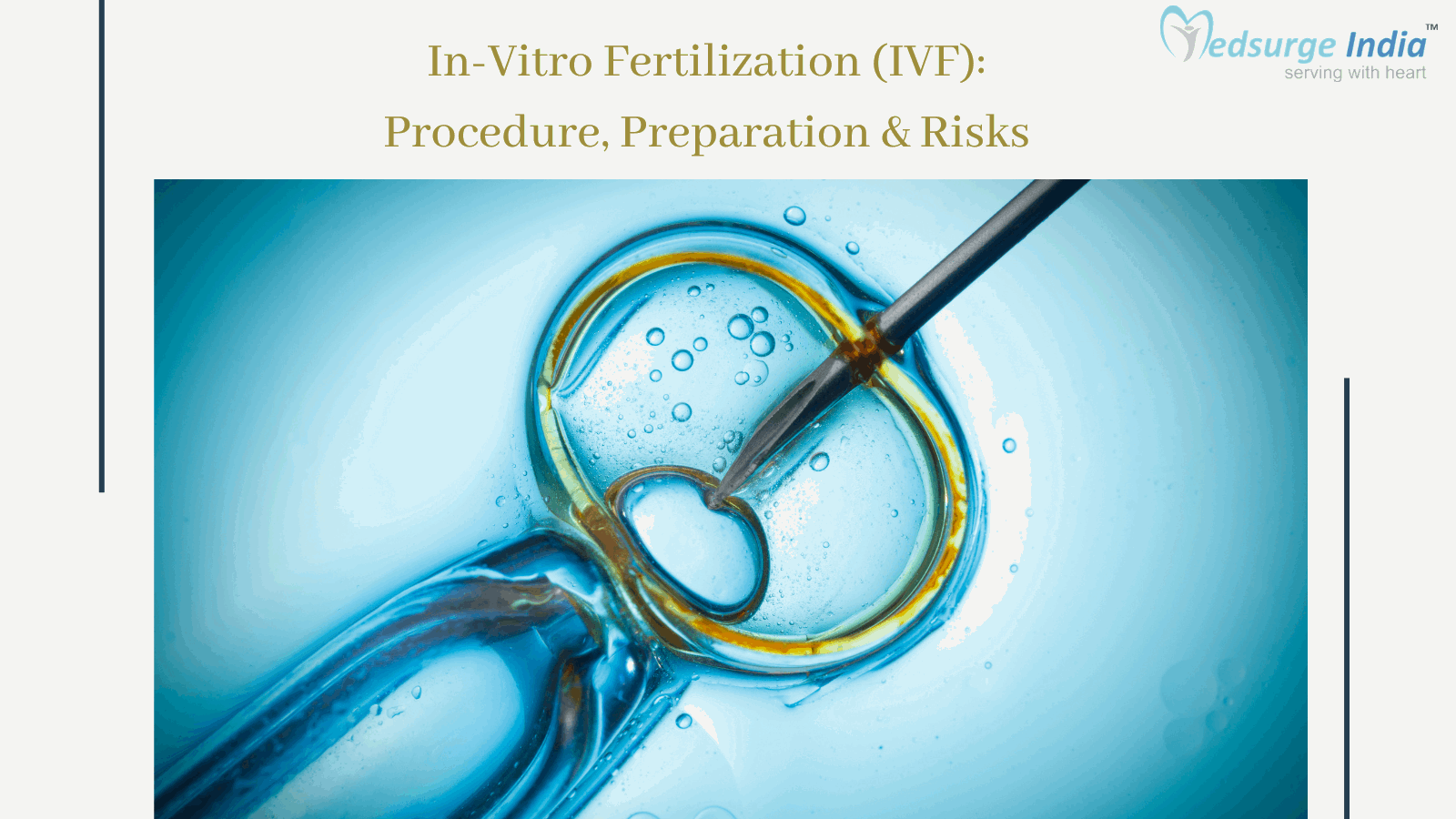In-Vitro Fertilization (IVF): Procedure, Preparation & Risks
“Accepting the need for IVF to conceive can be a very difficult prospect for most people/couples. Although IVF enhances the chances of having a baby, it is a physically and financially demanding procedure. IVF is today's top choice solution for those who have ended in failure to conceive after trying a variety of less complex alternatives and procedures such as Timed Intercourse or Intrauterine Insemination (IUI).”

A process called “in-vitro fertilization” (IVF) is intended to treat infertility and result in a live birth as a direct outcome of the intervention. It is currently utilized for purposes other than infertility and is one sort of assisted reproductive technology. IVF normally involves stimulating the ovaries with a range of reproductive medicines, retrieving an oocyte (or oocytes) from an ovarian follicle, and fertilizing the oocytes in a lab ("in vitro"). The embryo or embryos that are created are then implanted within the uterus. These stages typically take place over the course of two-week IVF cycles, which are intervals of time.
What is In-Vitro Fertilization?
An egg and sperm are combined within a dish during a process known as in-vitro fertilization.A woman's ovulatory cycle is monitored and boosted, as well as taking an ovum or an ova from her ovaries and fertilizing them in a lab with sperm.
IVF may employ depending on your circumstances such as:
- Your ovaries and the sperm of your spouse
- Your ova and sperm from a donor
- Donor eggs and sperm from your spouse
- Both donor sperm and donor eggs
- Donation of embryos
Success rates of IVF depend on a variety of factors, including your age and the reason for your infertility. Additionally, IVF can be expensive, intrusive, and time-consuming. Several embryos can be placed in the uterus during IVF, resulting in multiple pregnancies (multiple pregnancies).If you're unsure about whether IVF is the best way to treat your infertility, your doctor can explain how it works, the possible risks, and whether it's suitable for you.
Why is In-Vitro Fertilization Done?
IVF aids infertile couples who desire to have a child. Due to the cost and invasiveness of IVF, many couples first try other reproductive therapies. These could involve intrauterine insemination or using fertility medications. In that operation, sperm is directly injected into a woman's uterus by a medical professional.
The following infertility problems may call for IVF:
- Decreased fertility in women over 40
- Damaged or obstructed fallopian tubes
- Decreased ovarian activity
- Endometriosis
- Uterine tumors
- Male infertility is caused by factors including a low sperm count or sperm abnormalities
- Unaccounted-for infertility
If they run the danger of spreading a genetic condition to their children, parents may also opt for IVF. The embryos can be examined for genetic anomalies in a medical laboratory. Only then are embryos without genetic flaws implanted.
How is the Procedure of In-Vitro Fertilisation Carried Out?
IVF is a kind of assisted reproductive technique (ART). This implies that particular medical procedures are carried out to help a lady become pregnant. This is often used after other, less expensive reproductive treatments have failed.
IVF consists of numerous steps, including ovarian stimulation, egg retrieval, sperm retrieval, fertilization, and embryo transfer. IVF cycles typically last 3-4 weeks. It can take more than one cycle.
- The initial stage in IVF is to take fertility drugs for several months to assist your ovaries to generate numerous mature, ready-to-fertilize eggs. The process of causing ovulation is called "ovulation induction". It is possible to undergo routine ultrasounds or blood tests to monitor your hormone levels and egg production.
- Your doctor will extract the mature eggs from your body once your ovaries have generated an adequate number of them; this procedure is known as “egg retrieval”. Egg retrieval is a simple surgical procedure performed in the office of your doctor or at a fertility clinic.
- You will be given medication to make you more at ease and relaxed during the process. The doctor inserts a tiny, hollow tube into your ovary and the follicles that house your eggs using ultrasound to view inside your body. Using suction apparatus attached to the needle, the eggs are gently retrieved from each follicle.
- “Insemination” is the practice of fertilizing an egg in a laboratory using the sperm of either a spouse or a donor. Fertilization takes place while the eggs and sperm are kept together in a specific container. Direct injection of sperm into the eggs is an option for sperm with reduced motility (sperm that can't swim as well). Staff working in the lab keep track of how the cells in fertilized eggs split and develop into embryos.
- Embryo transfer occurs about 3-5 days following egg retrieval and involves the placement of one or more embryos into your uterus. The embryo is inserted into your uterus by a small tube that the doctor inserts right through your cervix.
- Any embryo that connects to your uterus' lining throughout pregnancy is considered to be pregnant. Embryo transfers are performed in a fertility clinic or at your doctor's office, and they are typically painless.
- Plan some downtime for the rest of the day after your embryo transfer. You can carry on with your regular activities the following day. Additionally, progesterone pills or daily injections may be administered for the first 8–10 weeks after the embryo transfer. Because of the hormones, the embryo has a better chance of surviving in your uterus.it is linked to the needle.
How do you Approach Preparation?
Before beginning an IVF cycle using your own eggs and sperm, you and your partner likely need to undergo a number of examinations, such as:
- Uterine exam: Before you begin IVF, your doctor will do a uterine exam to look at the lining inside the uterus. A sonohysterogram, in which fluid is injected into your uterus via the cervix, and an ultrasound may be used to provide images of your uterine cavity. Another option is a hysteroscopy, which involves inserting a lighted, thin, flexible telescope (hysteroscope) into your uterus via your vagina and cervix.
- Ovarian reserve testing: During the first few days of your menstrual cycle, your doctor may perform blood tests to measure the levels of follicle-stimulating hormone (FSH), estradiol (estrogen), and anti-mullerian hormone to estimate the quantity and quality of your eggs. It is possible to forecast how your ovaries will respond to fertility medications using test results, which are typically paired with an ultrasound of your ovaries.
- Semen examination: Your doctor will perform a semen analysis just before the beginning of an IVF treatment cycle if it wasn't done as part of your first fertility assessment.
- Practice transferring embryos: To establish the depth of your uterine cavity and the procedure most likely to properly implant the embryos into your uterus, your doctor may perform a mock embryo transfer
- Screening for infectious diseases: You and your partner will undergo HIV and other infectious disease screenings.
What is the Risk in In-Vitro Fertilization?
IVF can result in major problems for a number of reasons. Here are a few examples:
- Miscarriage: The miscarriage rate for women who conceive through IVF with fresh embryos is comparable to that of women who conceive spontaneously, ranging from 15% to 25%, however, the rate rises with maternal age.
- Birth defects: Regardless of the child's mode of conception, the mother's age is the main risk factor for the development of birth defects. It is necessary to conduct more research to establish whether particular birth abnormalities may be more likely to occur in offspring created through IVF.
- Ectopic pregnancy: When the fertilized egg implants outside the uterus, typically in a fallopian tube, about 2% to 5% of women who utilize IVF will experience this type of pregnancy. Because the fertilized egg cannot survive outside of the uterus, there is no means to continue the pregnancy.
- Complications of egg retrieval: Using an aspirating needle to gather eggs may result in hemorrhage, infection, or damage to the colon, bladder, or blood vessel. If used, sedation and general anesthesia have hazards as well.
- Cancer: Although some early research suggested there might be a connection between specific drugs used to increase egg formation and the emergence of a particular type of ovarian tumor more current investigations have refuted these claims. The chance of developing breast, endometrial, cervical, or ovarian cancer after IVF does not appear to be noticeably higher.
- Multiple births: If more than one embryo is transplanted to your uterus through IVF, the possibility of multiple births increases. Pregnancies with multiple fetuses are more likely to result in early labor and low birth weight than pregnancies with a single fetus.
- Low birth weight and premature delivery: According to research, IVF significantly raises the chance that the baby may be born prematurely or with low birth weight.
- Stress: IVF use can be financially, physically, and emotionally taxing, and you can get the support you need from therapists, family, and friends to get through the ups and downs of infertility treatment.
- It can also cause side effects such as bloating, cramping, breast tenderness, mood swings, headaches, bruising from shots, allergic reactions to medicines, bleeding, etc.
How can Medsurge India Help?
Medsurge India is a prestigious support system for patients looking for doctors, hospitals, and specialized treatments. We'll find the most suitable medical options for you.Regarding your medical issues, our team will give you a list of certified, reputable, and trusted doctors and hospitals. Additionally, we offer a treatment strategy that fits your budget. Apart, we assist patients with obtaining travel authorizations, medical visas, and a multitude of other things.








